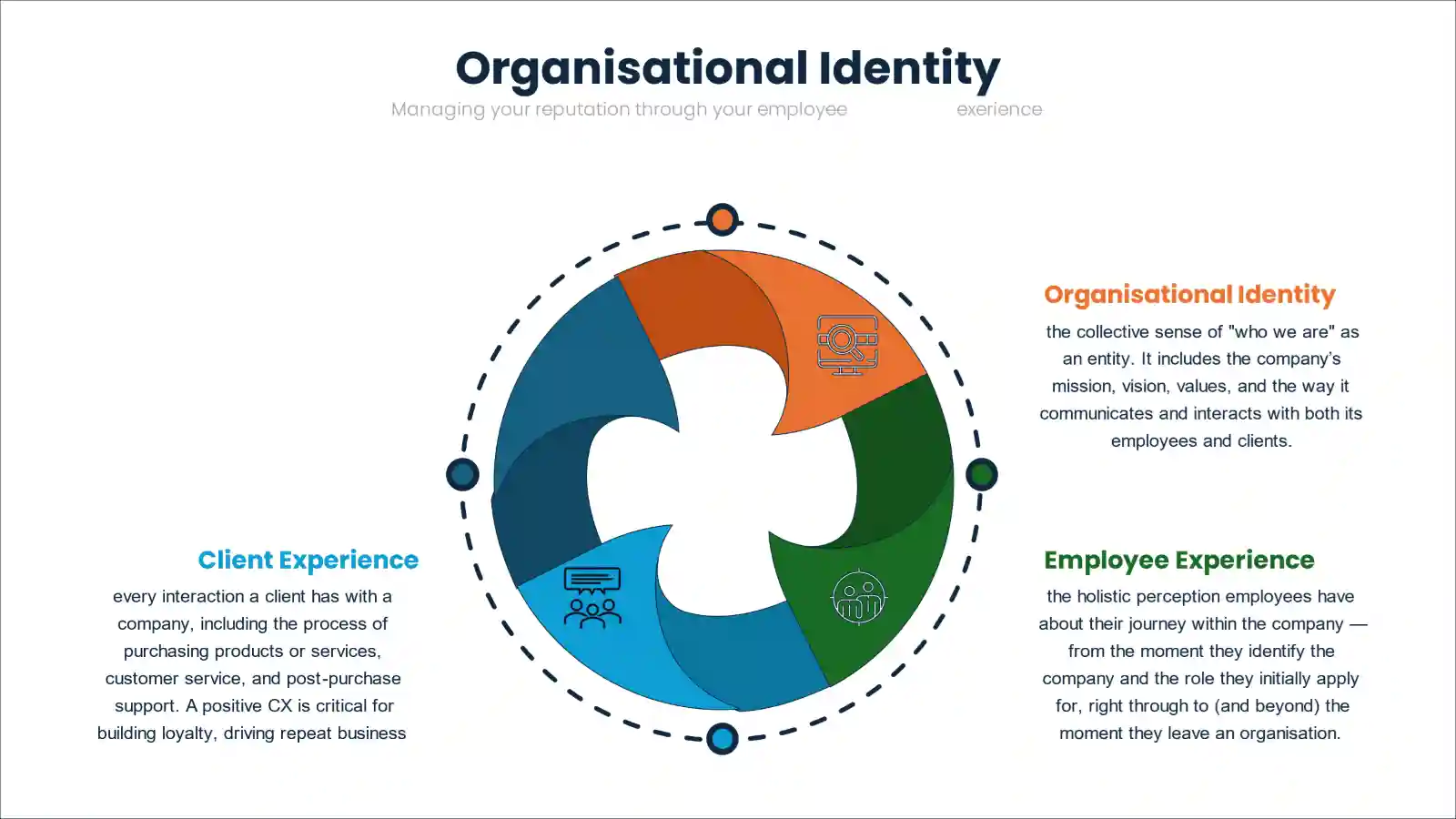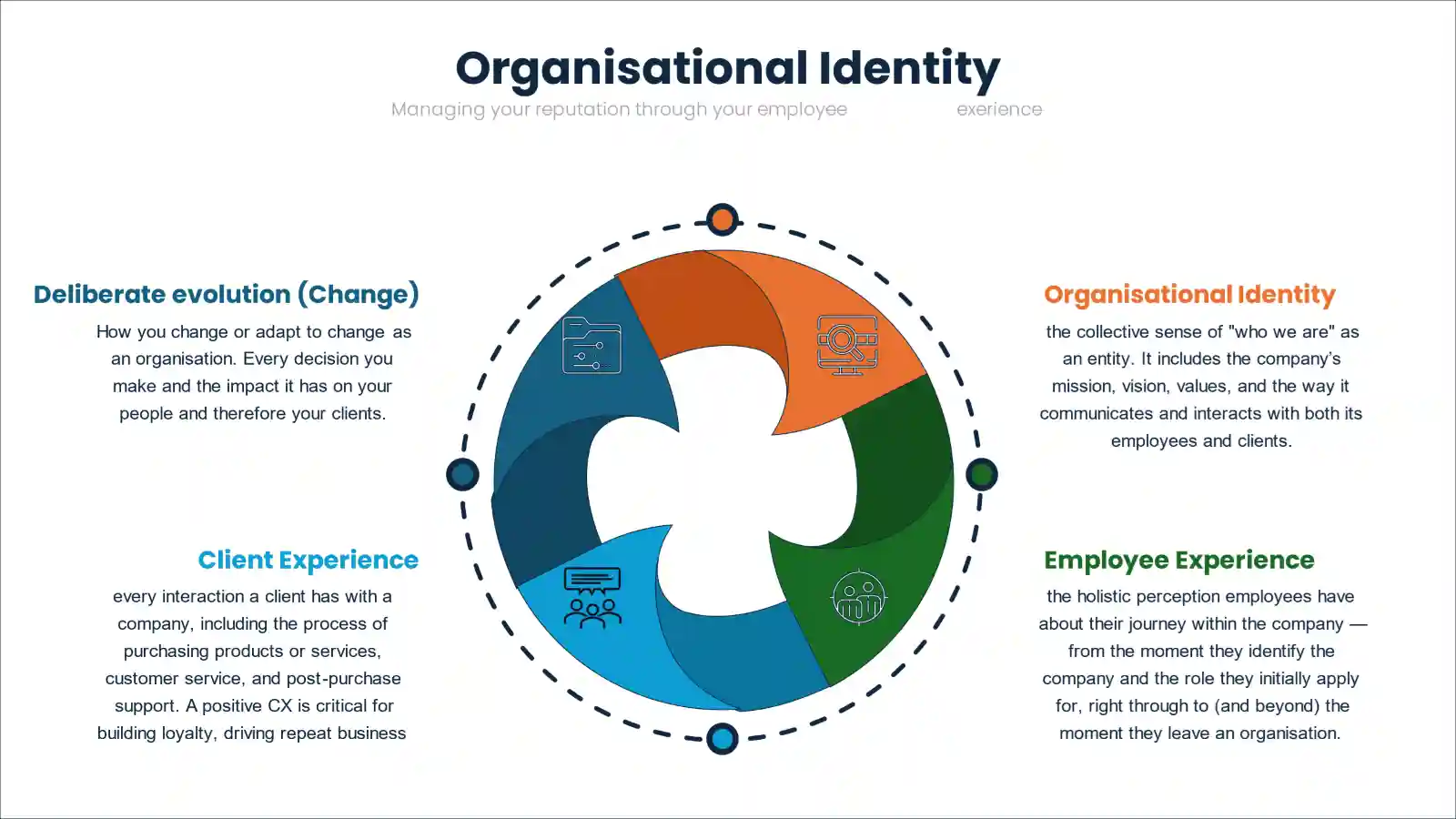Change is constant. It impacts how your business performs, how your people feel and how your clients perceive you.
Having a clear Organisational Identity (O.I) is fundamental to any organisation’s success, particularly when you need to change. Every change that happens impacts the O.I. of the business. Sometimes in the most imperceptible ways. O.I. is a combination of your core values, practices and principles. It’s what makes your organisation unique.
What is O.I?
Your O.I is who you ARE, not who you tell people you are; it’s not what you tell people your organisation is, it’s what they tell other people you are. For instance, a seemingly incredulous amount of organisations will claim to have “integrity” or to be “honest.” On closer inspection, the actions of the organisation may tell a very different story. The best organisations have a clear identity that is known to everyone. It is the clearest indication we have of the culture of the organisation or demonstrates “how you do things around here.”
The value of identity
On an individual level, identity has become a hot topic of late. How people identify is a crucial element of them being themselves. The debate around this continues to be divisive and toxic. Most recently, we have seen a supreme court ruling around the definitions of gender and sex - a ruling that could change again in the future.
For the moment, we have some clarity on the legal position, but we still have a wide range of perspectives and agendas in play. My advice around this remains consistent:
- Ensure you understand the legislation
- Work hard on managing your biases
- Be kind to everyone and try to understand their perspective, even if it doesn’t align to your own, even if it’s different to the latest court ruling
- Be collaborative in finding solutions and look for ways that can be a win for everyone
- Set your managers and leaders up for success, so that they can support their people
On the surface, O.I is nowhere near as toxic or complex, but if you allow it to develop accidentally, you shouldn’t be surprised when you no longer recognise your organisation. A strong O.I enables organisations to foster a sense of belonging and purpose, critical for maintaining morale and driving performance, especially during periods of transformation.
Just like with individuals, emotional intelligence begins with an organisation being self-aware. By deliberating shaping your O.I, it not only aligns the company’s internal processes and ways of working but also shapes how the business is perceived externally by clients.
Where Client and Employee Experience can add more value
Client Experience (CX) encompasses every interaction a client has with a company, including the process of purchasing products or services, customer service and post-purchase support - all critical for building loyalty and driving repeat business. Clients can easily perceive the company’s values and ethos, which helps to amplify trust and loyalty.
In the same way, we seek a consistent and united experience for our people in the form of the Employee Experience (EX). Employee Experience (EX) refers to the perception employees have about the company - from the moment they initially apply, right through to (and beyond) the moment they leave an organisation.
The EX encompasses various factors like workplace environment, engagement, growth opportunities and recognition. Elements you might suggest are all part of the traditional lifecycle. It is this cycle that we have redefined for a modern workplace, more of which you can read about in our latest whitepaper on navigating the return to office backlash.
How these concepts intertwine
A robust O.I is far more than just what is written on the company website, it is the actual identity of the business. This helps to cultivate a positive EX by providing clarity and consistency. When employees understand and resonate with the company’s identity, they are more likely to feel engaged and committed. This alignment fosters a collaborative atmosphere where employees are motivated to contribute to the company’s goals, they feel part of the organisation.
We can also think of it like this…

When every organisation was set up, it was created with an identity in mind. Over time, that identity has had to be adapted, to incorporate the evolution of its people as the organisation grows and the market changes. As we complete the cycle, the O.I influences and is influenced by both the CX and EX, significantly impacting an organisation’s performance.
When we talk about Organisational Transformation, it could be something small, such as a revision to a policy, or something huge, such as AI adoption. If you don’t consider the impact on the individuals of every change, you are likely to come unstuck, find that the system gets clogged up, find that your CX and/or EX is impacted negatively.
Most small changes are easy to manage, but very often aren’t. They take deliberate communication and good management of the changes and the people they impact. Therefore, anything bigger needs much more planning and deeper consideration.
We always start change projects with a diagnostic. We establish an “as is” state. What is the O.I today. This helps us to assess the size, the shape and the nature of the change proposed.

So, the missing piece, added in the illustration above is Deliberate evolution.
One of the key messages to take away is that the relationship between EX and CX is symbiotic. A positive EX leads to motivated and engaged employees who are more likely to deliver excellent service, directly impacting CX.
Transparent communication and involvement in the development of the organisation’s identity and transformation plans helps employees to understand their role and value, developing positive engagement and alignment.
Keep clients and employees committed and content
Change is inevitable. Doing nothing is not a strategy. Planning for change, being able to adapt to change, and taking your people and clients with you, make a huge difference to how your organisation is perceived and performs.
Having a deliberate strategy for your O.I and investing time and energy in developing a strong, constantly evolving O.I fosters engagement, loyalty, and excellence, ensuring that both employees and clients remain committed and content.
Get in touch
We want to get to know you, your business and the people challenges its facing. To discuss your goals and how NFP can help you achieve them, find out more about our organisational transformation solutions and reach out to one of our people specialists today.

Author
Steve Foulger, Director of Organisational Transformation and People Services
Steve has worked in the HR space since the turn of the millennium, providing some of the UK’s most recognised companies across numerous industries with specialist HR strategy support. Now as NFP’s Director of Organisational Transformation and People Services, he delivers pragmatic, sustainable, and commercially focused solutions to businesses undergoing challenging periods of organisational change.